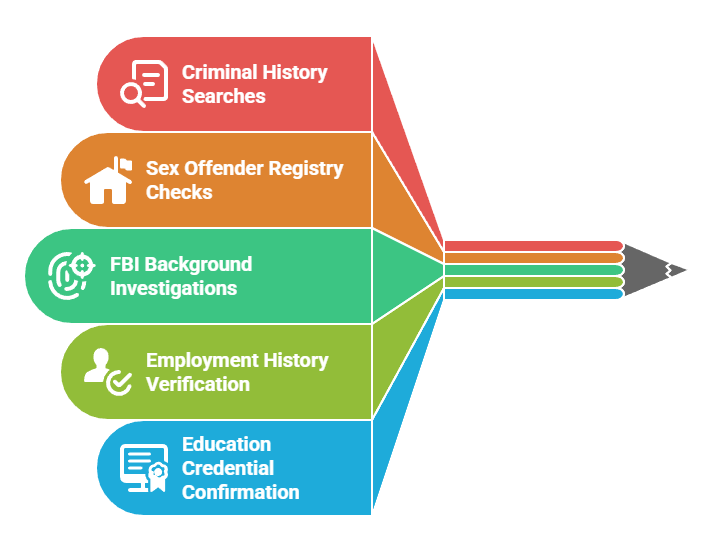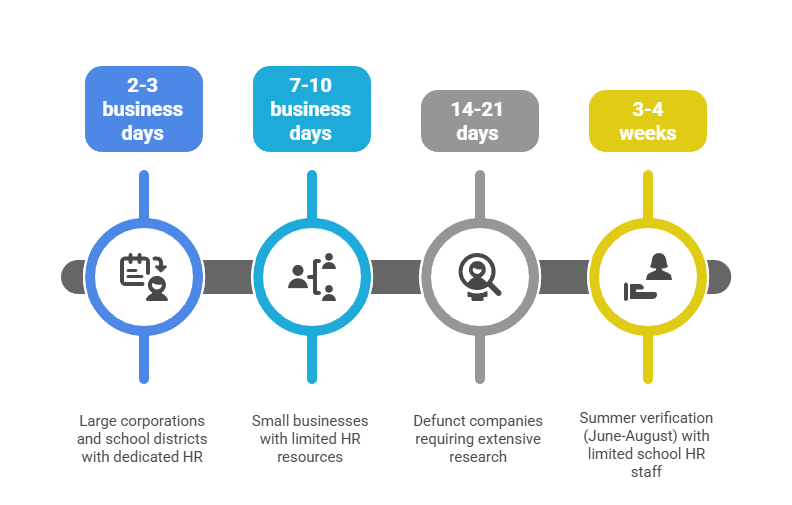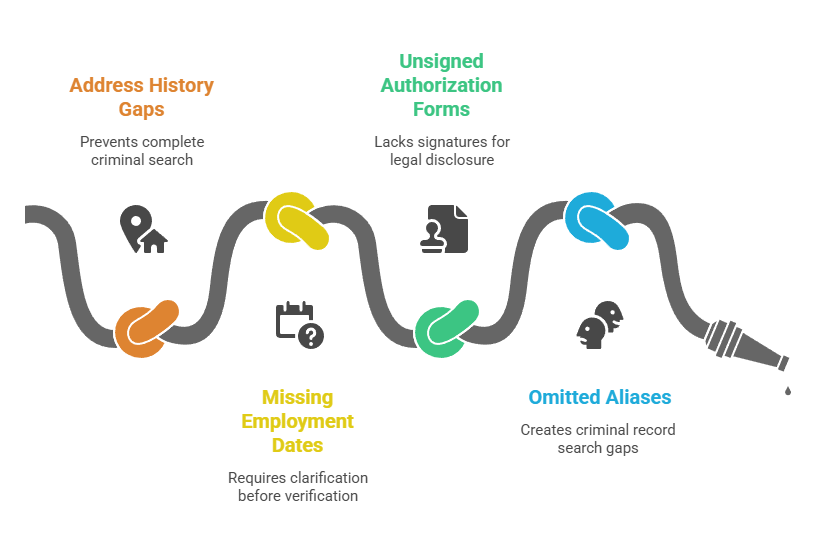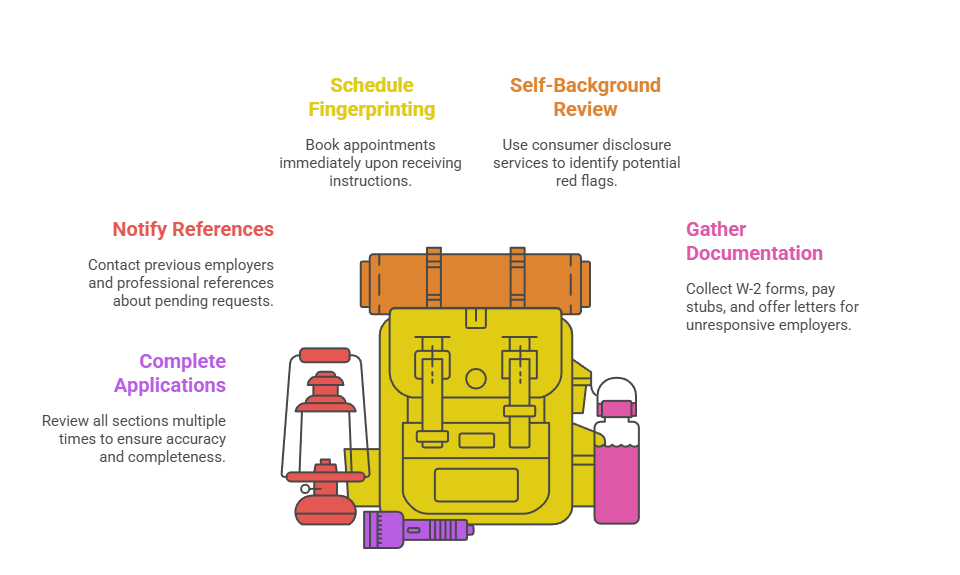Substitute teacher background checks typically take 3-14 business days to complete, though timelines vary significantly based on screening components, state requirements, and applicant preparation. Understanding each verification stage—from fingerprinting (1-3 days) to FBI criminal history checks (3-5 days) and employment verification (5-10 days)—enables both school administrators and applicants to minimize delays and maintain adequate staffing levels.
Key Takeaways
- Standard substitute teacher background checks require 3-14 business days on average, with state-specific requirements adding 1-4 weeks in jurisdictions requiring education credential verification or child abuse registry clearances.
- Fingerprint-based FBI checks typically process within 24-72 hours electronically, while manual submissions through mail can extend timelines to 8-12 weeks depending on state processing capacity.
- Criminal history searches at county and state levels usually complete within 2-5 business days, but jurisdictions with paper-based court records may require 7-14 days for thorough review.
- Employment and education verification represents the most unpredictable component, taking 5-10 business days when institutions respond promptly but extending to 3-4 weeks during summer breaks or with unresponsive references.
- Expedited background check options reduce processing time to 24-48 hours in 23 states, though premium services cost more than standard screening packages.
- Pre-employment preparation—including gathering documentation, completing applications accurately, and scheduling fingerprinting immediately—can reduce the overall timeline by 40-60%.
- Incomplete applications or discrepancies in reported information trigger adjudication reviews that add 5-15 business days to the standard process while compliance officers investigate inconsistencies.
- Emergency substitute teacher provisions in 38 states allow conditional employment with preliminary clearances, enabling candidates to work within 24-72 hours while comprehensive checks continue processing.
Understanding the Substitute Teacher Background Check Process
The substitute teacher screening process involves multiple verification layers designed to protect student safety while complying with state education codes and federal regulations. Unlike traditional employment background checks, educational screenings must satisfy both school district policies and state Department of Education mandates. This creates a more comprehensive—and time-intensive—review process.
School districts typically partner with Consumer Reporting Agencies (CRAs) specializing in education sector compliance to conduct these investigations. The Fair Credit Reporting Act (FCRA) governs how these agencies collect, report, and store applicant information. This establishes strict accuracy standards and disclosure requirements that directly impact processing timelines.
Primary Screening Components Required for Substitute Teachers
Most substitute teacher background checks include several core verification elements that operate on independent timelines. Each component contributes to the overall duration, with the slowest element determining when districts receive complete screening reports. Understanding these components helps set realistic expectations.
The standard screening package typically includes:

- Criminal history searches: County, state, and federal level investigations examining court records and conviction databases
- Sex offender registry checks: Nationwide database queries identifying registered offenders prohibited from school employment
- Fingerprint-based FBI background investigations: Biometric identification accessing the National Crime Information Center database
- Employment history verification: Confirmation of previous positions covering the past 5-7 years with supervisor references
- Education credential confirmation: Registrar verification of degrees, certifications, and coursework required for substitute positions
Criminal databases may return results within hours, while employment verification depends on third-party response rates. This asynchronous processing creates variability in overall completion times.
State-Specific Requirements That Affect Processing Time
Substitute teacher background check requirements differ substantially across states, directly impacting how long the screening takes. California requires LiveScan fingerprinting with Department of Justice and FBI clearance, tuberculosis testing, and mandated reporter training—a combination typically requiring 2-3 weeks. Texas mandates criminal history checks, fingerprinting, and employment verification, usually completing within 7-10 business days.
States with centralized education background check systems generally process applications faster than those requiring multiple independent clearances. New York's TEACH system consolidates several verification steps, reducing timelines to 5-10 days. Florida's multi-agency approach involving local school boards, the Florida Department of Education, and the Florida Department of Law Enforcement can extend processing to 3-4 weeks.
Differences Between Initial Screening and Renewal Checks
First-time substitute teacher applicants undergo the most comprehensive background investigation, establishing a baseline clearance record. This initial screening examines complete criminal history, verifies all educational credentials, and conducts thorough employment verification.
Renewal background checks for returning substitute teachers typically process faster, often completing within 2-5 business days. Many states maintain clearance certificates valid for 3-5 years, requiring only updated criminal history searches. Some districts implement continuous monitoring systems that flag new criminal activity in real-time, further streamlining the renewal process.
Criminal History Check Timeline: County, State, and Federal Searches
Criminal background investigations form the foundation of substitute teacher screening, protecting students from individuals with disqualifying offenses. These searches operate at three jurisdictional levels, each with distinct databases and processing speeds. Understanding how each level functions helps applicants and administrators anticipate timeline variations.
| Search Level | Processing Method | Typical Timeline |
| County Criminal Records | Court clerk searches, manual or electronic | 1-10 business days |
| State Criminal Database | Centralized state repository queries | 2-4 business days |
| FBI Fingerprint Check | National Crime Information Center access | 24-72 hours (electronic) |
County-level searches examine court records in specific jurisdictions where applicants have lived, worked, or attended school. State-level checks query centralized repositories maintained by state police agencies. Federal searches access the FBI's comprehensive nationwide database containing records from all 50 states.
County Criminal Record Search Duration
Modern counties with digital court management systems return criminal history results within 24-48 hours through electronic database queries. Background check companies access these records through direct court integrations or consolidated county database services. This enables rapid turnaround for substitute teacher screenings in metropolitan areas with updated infrastructure.
Rural counties and jurisdictions maintaining paper-based court records require manual research by court runners who physically visit courthouses to review case files. This manual process extends county criminal searches to 5-10 business days, particularly when covering multiple counties across an applicant's residential history. The substitute teacher background check timeline increases proportionally with the number of counties requiring manual investigation.
State Criminal Database Processing Time
State-level criminal history checks query centralized repositories that aggregate conviction records from courts throughout the state. These databases provide broader geographic coverage than individual county searches. Most state repositories return results within 2-4 business days through electronic submissions.
Processing speed varies based on state database quality and submission method. States with comprehensive reporting from all counties and electronic query systems complete searches within 24-72 hours. However, 14 states maintain incomplete databases due to inconsistent county reporting. Mail-based submissions to state agencies without electronic options can take 7-14 days.
FBI Fingerprint Check Processing Duration
Federal Bureau of Investigation background checks represent the most comprehensive criminal search component, accessing the National Crime Information Center database. This includes records from all 50 states, federal courts, and participating territories. FBI checks specifically identify disqualifying offenses related to child safety, violence, and sexual misconduct.
Electronic fingerprint submissions through LiveScan or digital fingerprinting technology typically receive FBI results within 24-72 hours. The channeler system, where approved agencies electronically submit prints directly to the FBI, provides the fastest turnaround. Traditional ink-and-paper fingerprint cards submitted by mail require 8-12 weeks for processing, though most school districts now utilize electronic methods to minimize substitute teacher screening delays.
Employment and Education Verification Timelines
Reference checks and credential verification represent the most unpredictable components of substitute teacher background investigations. Unlike database searches that provide immediate or near-immediate results, employment and education verification relies on third-party responsiveness. This introduces significant timeline variability that frustrates both applicants and hiring administrators.
Professional verification confirms that applicants accurately represented their work history, educational achievements, and professional credentials. This process protects districts from credential fraud while satisfying state education codes requiring documented proof of qualifications. The verification depth varies by district policy.
Employment History Verification Duration
Employment verification for substitute teacher positions typically examines the most recent 5-7 years of work history. Background check companies contact previous employers to confirm dates of employment, job titles, separation circumstances, and eligibility for rehire. Verification requests go out via phone, email, fax, or online portals depending on each employer's preferred method.
Verification timelines vary dramatically by employer type and season:

- Large corporations and school districts: 2-3 business days with dedicated HR departments and automated verification services
- Small businesses: 7-10 business days due to limited HR resources and varied communication methods
- Defunct companies: 14-21 days requiring extensive research through state business records and alternative contacts
- Summer verification (June-August): 3-4 weeks when school HR offices operate with limited staff during break periods
Responsive employers with dedicated verification departments return confirmation within 2-3 business days. Small businesses, defunct companies, and organizations without formal HR departments extend verification timelines substantially as researchers attempt multiple contact methods.
Education Credential Confirmation Processing Time
Education verification confirms that applicants possess the degrees, certifications, and coursework required for substitute teaching positions. Background check companies contact registrar offices at colleges and universities attended. They request official transcripts or degree confirmation letters that document graduation dates, majors, and conferred credentials.
Universities with online verification portals or membership in the National Student Clearinghouse provide near-instant credential confirmation, returning results within 24-48 hours. Institutions requiring written verification requests or manual registrar review typically respond within 5-7 business days during regular academic terms. International education verification introduces substantial timeline extensions, often requiring 3-6 weeks for degree confirmation from foreign institutions.
Fingerprinting Requirements and Processing Speed
Fingerprint collection serves dual purposes in substitute teacher background checks: providing biometric identification for FBI criminal history searches and creating permanent clearance records for state education databases. The fingerprinting process itself adds 1-3 days to overall timelines. However, scheduling availability and applicant preparedness significantly influence this component's duration.
States mandate specific fingerprinting methods and approved collection sites. This typically requires applicants to visit designated locations rather than using mobile fingerprinting services. The requirement ensures chain-of-custody integrity and compliance with FBI submission standards.
LiveScan Electronic Fingerprinting Timeline
LiveScan technology captures fingerprints digitally and transmits them electronically to state repositories and the FBI. This eliminates mail delays and reduces processing time to 24-72 hours from submission to results. Most metropolitan areas offer multiple LiveScan locations, including school district offices, law enforcement facilities, and private fingerprinting service providers.
Appointment availability directly impacts how long this step takes. High-volume locations in urban districts may require 5-10 business days for scheduling, while lower-demand areas often accommodate walk-ins or next-day appointments. LiveScan quality rejections occur in approximately 5-8% of submissions when fingerprints fail to meet FBI image quality standards. Poor print quality triggers automatic rejection notices within 24-48 hours, requiring applicants to return for reprinting.
Traditional Fingerprint Card Processing Duration
States without universal LiveScan access still utilize ink-and-paper fingerprint cards that require physical mailing to state agencies and the FBI. This method extends processing timelines significantly. Mail transit consumes 3-5 days each direction and manual processing requires 4-8 weeks at FBI facilities.
Card-based fingerprinting remains common in rural areas with limited LiveScan infrastructure. Applicants in these jurisdictions should factor 8-12 weeks into their substitute teacher background check timeline expectations. Quality issues affect traditional fingerprint cards more frequently than LiveScan submissions, with 12-15% rejection rates due to smudging, incomplete prints, or inadequate ink coverage.
State-Specific Clearances and Additional Requirements
Beyond standard background check components, many states mandate specialized clearances addressing specific child safety concerns. These additional requirements significantly extend how long substitute teacher background checks take. They often add 1-4 weeks to the baseline timeline depending on state processing capacity and verification methods.
Understanding which supplementary clearances your state requires enables accurate timeline projections and proper applicant preparation. Failing to initiate these additional checks simultaneously with standard background screening creates sequential delays. This unnecessarily extends the hiring process.
Child Abuse Registry Clearances
Twenty-nine states require substitute teacher applicants to obtain clearances from state child abuse and neglect registries. These clearances verify that candidates don't appear in child protective services databases. They identify individuals with substantiated abuse or neglect findings, preventing them from working in positions with child access regardless of whether incidents resulted in criminal charges.
Registry clearance processing varies substantially by state infrastructure:
- Pennsylvania ChildLine: Online applications returning results within 7-14 days through automated systems
- New Jersey Division of Child Protection and Permanency: Manual review processes requiring 2-4 weeks for clearance issuance
- Consolidated state systems: Integrated registry checks within education background screening, eliminating separate applications
- Adjudication for common names: False-positive matches requiring identity verification adding 5-10 business days
Applicants with common names occasionally receive false-positive matches requiring identity verification before clearance issuance. Providing comprehensive identifying information—including middle names, dates of birth, and previous addresses—helps prevent these delays.
TB Testing and Health Clearances
Tuberculosis testing requirements in states like California, New York, and several others add health screening components to substitute teacher background checks. While not background investigations per se, TB test results must be current before employment clearance. This integrates the timeline into the overall hiring process.
TB skin tests require two appointments: initial tuberculin injection and a follow-up reading 48-72 hours later. The complete process consumes 3-5 days, though scheduling availability at testing facilities may extend this to 1-2 weeks. TB blood tests provide results within 24-48 hours from a single appointment but cost $80-150 compared to $20-40 for skin tests.
Common Delays and How to Avoid Them

Understanding frequent bottlenecks in the substitute teacher screening process enables both applicants and administrators to implement preventive strategies. Research indicates that 40-60% of timeline extensions result from preventable issues. These relate to application quality, documentation completeness, and preparation thoroughness.
Proactive planning addresses these common delay factors before they impact processing speed. This maintains hiring momentum during peak substitute recruitment periods when districts face urgent staffing needs. Strategic preparation can reduce overall timelines by one to two weeks.
Incomplete Applications and Missing Information
Incomplete background check applications represent the single most common delay factor, affecting approximately 35% of submissions. Missing signatures, incomplete address histories, unexplained employment gaps, and omitted middle names prevent background check companies from conducting thorough investigations. These issues add 5-15 business days to processing timelines.
The most problematic application deficiencies include:

- Seven-year address history gaps: Incomplete residential records preventing proper county criminal search coverage
- Missing employment dates: Approximate timeframes requiring clarification before verification outreach can begin
- Unsigned authorization forms: FCRA compliance documents lacking required applicant signatures for legal disclosure
- Omitted aliases or maiden names: Previous names not disclosed, creating criminal record search gaps
Verification companies typically attempt to contact applicants to obtain missing information, but phone tag and email delays extend timelines unnecessarily. Many organizations implement quality control reviews before submission, identifying incomplete sections and requesting corrections upfront. This practice reduces overall substitute teacher background check duration by 7-10 days on average.
Discrepancies Requiring Adjudication
Information inconsistencies between application statements and verification results trigger adjudication reviews by compliance specialists. These professionals investigate discrepancies before issuing clearance decisions. Common discrepancies include mismatched employment dates, unreported previous employers, degree information differing from registrar records, and criminal history entries that applicants failed to disclose.
Adjudication extends substitute teacher background check timelines by 5-15 business days while investigators gather additional documentation. They contact applicants for clarification and assess whether discrepancies represent honest errors or intentional misrepresentation. Applicants minimize adjudication delays by disclosing all requested information upfront, even when uncertainty exists about whether specific items require reporting.
Reference and Employer Unresponsiveness
Unresponsive references and previous employers create the most unpredictable delays in substitute teacher screening timelines. Background check companies typically make 3-5 contact attempts across 10-15 business days before documenting inability to verify. This extends processing substantially when multiple employers prove difficult to reach.
Applicants should notify all listed references and previous employers about pending verification requests, encouraging prompt response to inquiries. Providing multiple contact methods—including personal email addresses alongside official company contacts—increases successful verification rates. School districts can reduce verification delays by accepting alternative documentation when employers remain unresponsive.
Expedited Background Check Options and Emergency Provisions
Twenty-three states offer expedited background check processing for substitute teacher positions, recognizing that prolonged hiring timelines create classroom coverage gaps. These accelerated services reduce standard 3-14 business day timelines to 24-48 hours through dedicated processing resources. Premium fee structures support these expedited options.
Expedited options prove particularly valuable during mid-year hiring when unexpected substitute shortages emerge. They also help when candidates require rapid clearance to accept time-sensitive positions. Understanding expedited service availability, costs, and limitations enables strategic deployment during critical hiring situations.
Premium Processing Services and Costs
Premium background check services prioritize substitute teacher applications through dedicated processing channels. Specialized researchers handle expedited cases, assigning immediate attention to verification activities. Criminal database searches, employment verification calls, and education confirmation requests bypass standard processing queues.
| Service Level | Timeline | Cost Premium | Best Use Case |
| Standard Processing | 7-10 business days | $75-200 (base fee) | Regular hiring cycles |
| Expedited Processing | 24-48 hours | $125-350 total | Emergency coverage needs |
| Rush Processing | 12-24 hours | $200-450 total | Critical staffing shortages |
Expedited substitute teacher background checks typically cost $50-150 beyond standard screening fees. This represents a 40-100% premium pricing structure. However, the investment reduces turnaround from 7-10 business days to 24-48 hours for most applicants.
Emergency Substitute Provisions
Thirty-eight states maintain emergency or provisional substitute teacher employment provisions that allow candidates to begin working with preliminary clearances. Comprehensive background checks continue processing during this conditional employment period. These frameworks balance student safety with practical staffing realities, enabling rapid classroom coverage during substitute shortages.
Emergency provisions typically require instant-result screening components—sex offender registry checks, social security verification, and terrorist watch list searches. These complete within minutes to hours. Districts may employ candidates conditionally after these preliminary clearances, with continued employment contingent on satisfactory completion of comprehensive background investigations.
Optimizing the Background Check Process
Strategic process optimization reduces how long substitute teacher background checks take without compromising investigation thoroughness or compliance standards. Both applicants and school administrators can implement specific practices that eliminate common delays. These streamline verification workflows effectively.
Systematic preparation, clear communication protocols, and technology integration create efficient screening pipelines. These maintain substitute teacher availability while upholding rigorous safety standards. Process improvements benefit all stakeholders in the hiring ecosystem.
Applicant Preparation Best Practices
Substitute teacher candidates should gather essential documentation before initiating background checks. Required materials include government-issued identification, Social Security cards, complete address histories for the past 7-10 years, employment records with supervisor contact information, and education credentials with registrar details. This preparation enables accurate application completion without delays for information gathering.
Strategic preparation steps that reduce processing time:

- Schedule fingerprinting immediately: Book appointments upon receiving background check instructions rather than waiting for additional steps
- Conduct self-background review: Use consumer disclosure services to identify potential red flags requiring proactive explanation
- Notify references in advance: Contact previous employers and professional references about pending verification requests
- Gather alternative documentation: Collect W-2 forms, pay stubs, and offer letters for employers with known responsiveness issues
- Complete applications thoroughly: Review all sections multiple times to ensure accuracy and completeness before submission
Candidates should review their own background information before submission using consumer disclosure services, county court record searches, or credit reports. This self-audit identifies potential red flags requiring explanation, enabling proactive disclosure rather than reactive adjudication.
District Process Improvements for Hiring Managers
School districts should implement year-round substitute teacher recruitment rather than concentrated pre-school-year hiring. Continuous recruitment distributes background check volume across months. This reduces processing delays caused by overwhelmed screening companies during August peak periods.
Establishing partnerships with background check companies that specialize in education sector compliance often yields faster turnaround times. Education specialists understand state-specific requirements and maintain established relationships with education registrars for faster verification. They prioritize education sector clients during peak periods, ensuring consistent service levels.
Conclusion
Substitute teacher background checks typically require 3-14 business days for completion, with timelines varying based on state requirements and applicant preparation quality. Understanding the duration of each verification element enables realistic timeline expectations and strategic planning. Both school administrators and candidates can implement specific practices that minimize delays, including thorough application completion and prompt fingerprinting scheduling. Emergency substitute provisions in most states provide interim employment options while comprehensive screenings process, balancing operational needs with safety standards.
Frequently Asked Questions
How long does a substitute teacher background check take on average?
Substitute teacher background checks typically take 3-14 business days for standard processing, including criminal history searches (2-5 days), FBI checks (1-3 days), and employment verification (5-10 days). State-specific requirements like child abuse registry clearances can extend timelines to 3-4 weeks. Expedited processing options in 23 states reduce turnaround to 24-48 hours for premium fees of $50-150 above standard costs.
Can I work as a substitute teacher while my background check is being processed?
Thirty-eight states allow emergency substitute teaching with preliminary clearances that complete within 24-72 hours, including sex offender registry checks and terrorist watch list searches. Emergency employment typically includes restrictions such as maximum consecutive working days (20-30 days) and required supervision by permanent staff. Continued employment remains conditional on satisfactory completion of the full background investigation.
What causes delays in substitute teacher background checks?
Common delays include incomplete applications (adding 5-15 days), discrepancies triggering adjudication reviews (5-15 days), unresponsive employers (7-21 days), and fingerprint quality rejections (3-7 days). Summer hiring creates additional delays when school HR departments have limited availability. Applicants minimize delays through thorough application completion, prompt fingerprinting scheduling, and advance notification of references.
How long does FBI fingerprint processing take for substitute teachers?
Electronic fingerprint submissions through LiveScan receive FBI results within 24-72 hours for approximately 92-97% of submissions meeting quality standards. Traditional ink-and-paper fingerprint cards require 8-12 weeks for FBI processing. About 3-7% of submissions require additional processing time (5-10 days) due to fingerprint quality issues or criminal history records requiring detailed examination.
Do substitute teacher background checks vary by state?
Yes, requirements vary significantly across states, directly impacting processing timelines. Twenty-nine states mandate child abuse registry clearances (adding 1-3 weeks), while states like California require tuberculosis testing (adding 3-5 days). Some states like New York use consolidated screening systems processing faster (5-10 days), while others require multiple independent clearances extending timelines to 3-4 weeks.
How much does expedited substitute teacher background check processing cost?
Expedited services cost $50-150 beyond standard screening fees of $75-200, representing a 40-100% premium. These services reduce processing from 7-10 business days to 24-48 hours for most components. However, FBI fingerprint checks already process within 24-72 hours electronically, and state agency clearances follow mandated timelines regardless of premium payments.
What documents do I need for a substitute teacher background check?
Required documentation includes government-issued photo identification, Social Security card, complete residential address history for 7-10 years with exact dates, detailed employment history for 5-7 years with supervisor contact information, and education credentials with institution names and graduation dates. Some states require additional documentation such as TB test results or child abuse clearance applications.
Can previous background checks be transferred between school districts?
Many states allow background check portability for clearances completed within the past 12-24 months, though transferability rules vary by state and district policies. Some states maintain centralized clearance databases that multiple districts can access, eliminating redundant screenings. Candidates should inquire about reciprocity policies when applying to multiple districts to avoid duplicative processing fees and timeline delays.
Additional Resources
- State-by-State Substitute Teacher Requirements and Certification Guide
https://www.teachercertificationdegrees.com/careers/substitute-teacher/ - Fair Credit Reporting Act Compliance for Employment Screening
https://www.ftc.gov/business-guidance/resources/using-consumer-reports-what-employers-need-know - U.S. Department of Education Educator Background Check Guidelines
https://www2.ed.gov/policy/elsec/guid/secletter/110607.html
Still have questions?
Get in touch with our team today for a personalized demo and discover how our tailored volume pricing and packages can drive results for your business!
How useful was this page?*
Note: your comments are anonymous. We use them to improve the website. Do not include any personal details.
Visit our FCRA Compliance Tool or leave a message here if you need a response.
From the blog Explore the GCheck Content Hub

What Shows Up on a Home Health Aide Background Check: A Complete Compliance Guide for Employers and Job Seekers
4 Dec, 2025 • 18 min read
Hospital Volunteer Background Check: Complete Compliance Guide for Healthcare Facilities
4 Dec, 2025 • 20 min read
Florida MVR Check: Complete Guide to Driving Record Screening for Employers
4 Dec, 2025 • 16 min readThe information provided in this article is for general informational and educational purposes only and should not be construed as legal advice or a substitute for consultation with qualified legal counsel. While we strive to ensure accuracy, employment screening laws and regulations—including but not limited to the Fair Credit Reporting Act (FCRA), Equal Employment Opportunity Commission (EEOC) guidelines, state and local ban-the-box laws, industry-specific requirements, and other applicable federal, state, and local statutes—are subject to frequent changes, varying interpretations, and jurisdiction-specific applications that may affect their implementation in your organization. Employers and screening decision-makers are solely responsible for ensuring their background check policies, procedures, and practices comply with all applicable laws and regulations relevant to their specific industry, location, and circumstances. We strongly recommend consulting with qualified employment law attorneys and compliance professionals before making hiring, tenant screening, or other decisions based on background check information.

